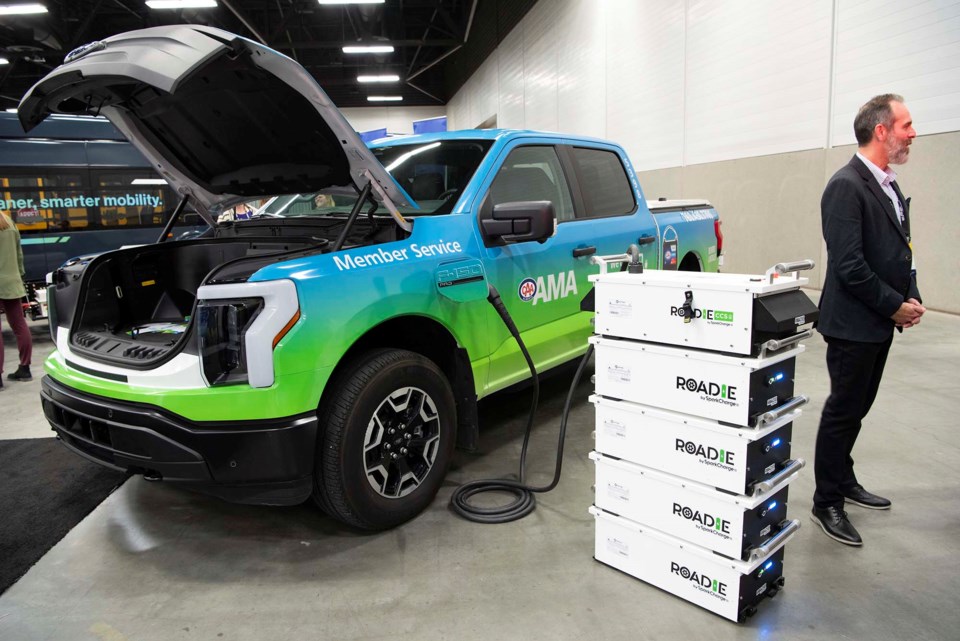Canadians need to get strategic with their money if they want to ensure rural drivers aren’t left out of the electric car future, says an expert panel.
Sustainable transportation advocates met in Edmonton Nov. 15 for a panel discussion on rural charging for electric vehicles during the 2023 Electric Mobility Canada conference.
The federal government announced in 2021 that all new cars and trucks sold in Canada after 2035 would have to be zero-emission vehicles (typically electric). Those cars will need charging stations, which are exceedingly rare outside of major cities. Plugshare.com shows 10 in Sturgeon County, for example, none of which are west of Hwy. 2, and zero between Athabasca and Fort McMurray. Edmonton, in contrast, has about 150.
“There’s definitely a shortage of charging infrastructure in rural areas,” panellist Danielle Wiess of the Community Energy Association (a non-profit that works with industry and government to promote sustainable transportation) said in an interview — a problem for both city-dwellers who want to adventure in the country and rural residents who need to get to cities for services.
This infrastructure gap becomes a safety issue during emergencies such as this year’s wildfire-induced evacuation from Yellowknife, noted panel moderator Scott Sharabura.
“It’s a 12 hour drive from Yellowknife to Edmonton,” he said, and it’s tough to even get gasoline to that region.
“Just imagine you are an EV (electric vehicle) driver making sure you can actually safely evacuate to a community that can safely host you. It’s not a simple task.”
Bridge the gap
Wiess said most EV charger companies have concentrated their stations in cities and along high-traffic roads to maximize their returns. There’s simply not enough EV drivers in rural areas right now to justify stations there without public investment.
Federal grants for charging stations have also disproportionately flowed to urban centres, said panellist William York, a senior engineer with ATCO who was a key player in the creation of the Peaks to Prairies charging network in southern Alberta. Such grants should be retargeted at rural areas and fully fund the cost of the stations.
“We don’t need another charging station in Edmonton paid for by the taxpayer,” he said.
Wiess said governments and industry have to work together to place and fund chargers strategically. Her group helped bring chargers to southern Alberta through the Peaks to Prairies project, for example, which saw municipalities, chambers of commerce, and ATCO team up to find the money, land, and best locations for rural chargers. The proposed EVenture project would create a similar network in northwest Alberta.
“It’s key to approach it from a regional perspective,” Wiess told the panel, and to make sure you don’t end up with isolated islands of chargers.
Wiess noted that transportation is typically one of the biggest sources of heat-trapping pollution in rural areas, making electric vehicles essential to meeting Canada’s climate goals. Rural charging networks are also economic drivers, as they can draw tourists to remote areas.
In an email, Bon Accord economic development officer Jenny Larson (who was not part of the panel discussion) said her town’s seven EV chargers (which were funded with federal and provincial money) have helped draw tourists from throughout B.C. and Alberta.
“We are also the perfect stopping point along Hwy. 28 to avoid the city traffic and ‘recharge’ in mind, body and car,” she continued, with the town’s chargers located within walking distance of local trails and restaurants.
Rural access to EV chargers is a matter of equity, Wiess said.
“Being a rural citizen shouldn’t mean you’re a second-class citizen. You should be provided with the same access to infrastructure as those who dwell in urban centres.”



